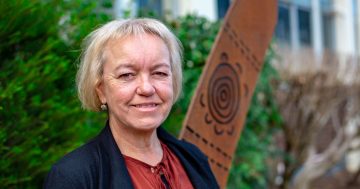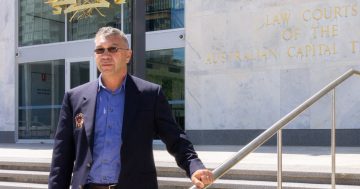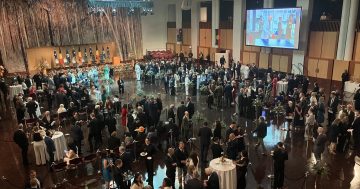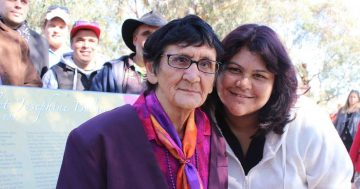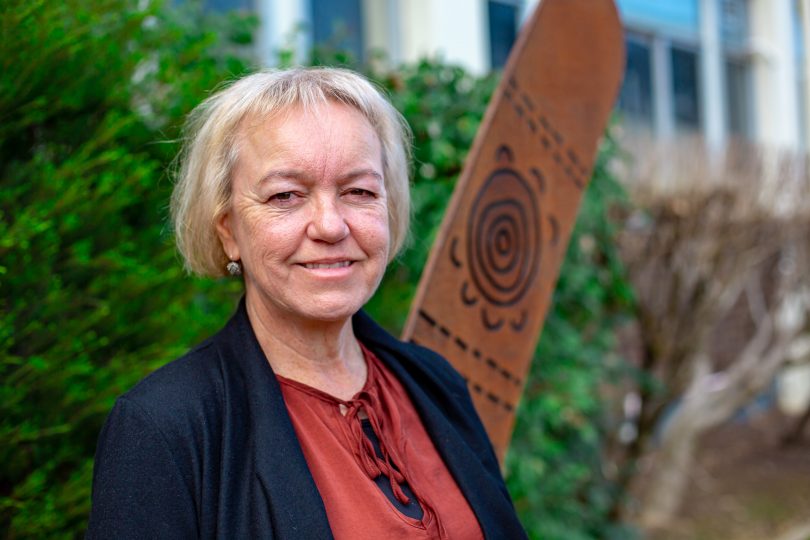
Ngunnawal traditional owner Caroline Hughes of the Yurauna Centre at CIT. Photo: File.
In the span of one lifetime, Caroline Hughes has gone from being denied the right to speak her native language to today hearing the ACT Legislative Assembly’s Acknowledgement of Country delivered in Ngunnawal – the local Indigenous language.
Aunty Caroline, a Ngunnawal elder who is the director of the CIT Yurauna Centre and sits on the Aboriginal and Torres Strait Islander elected body, was banned from speaking her language as a child and saw it deteriorate to a point where certain words have been lost.
“From a Ngunnawal perspective we are so proud that the political leaders of the ACT have demonstrated their recognition and cultural respect of the Ngunnawal people and our language,” Aunty Caroline said.
“My mother and a couple of our sisters were taken as a part of the Stolen Generation and we were told to never speak our language in front of people or we would be taken away. We were taught some language but not what my mother or grandparents knew.
“I had pains in my stomach one day and the nuns would not help me until I spoke the right words and I did not know the English word for stomach. I was only about seven or eight.”
This is the historic moment ACT Speaker @JoyBurchMLA delivered the Acknowledgement to Country in Ngunnawal in the @ACT_Assembly – a first for any Australian Parliament! #auspol #ACTpol pic.twitter.com/zYx6I4nZWW
— Dominic Giannini (@domgiannini2) July 30, 2020
The historic moment marked the first time an Australian Parliament has used an Indigenous language to acknowledge the traditional custodians at the start of a sitting day – four years after former Prime Minister Malcolm Turnbull opened his 2016 Closing the Gap address in Ngunnawal.
“I remember listening to Malcolm Turnbull and I cried,” she said. “The tears just flowed and my heart was so full of pride.
“I had very similar emotions today. My heart is so full and I cry with happiness because these are our non-Indigenous leaders demonstrating that our people matter.”
Cheyne Halloran, a Ngunnawal man who taught Speaker Joy Burch the pronunciation of the words before her address, said today marks an important step forward for a language that is still in a reformation process after a large portion of it was lost over the last century.
“It is a promising step in reconciliation,” he said. “As a Ngunnawal man, I was proud to be able to teach the language.
“It is a good step in the Legislative Assembly that the speaker learns it, but I think all members should learn how to acknowledge a country before any events they go to or speak at.
“There needs to be more of a relationship between the Government and the Elders and the language group so the community can start to learn their own language as well [as] there are not many who can speak Ngunnawal [in the community].”
Parliamentarians from all sides of the aisle then took the time to pay their respects to Ngunnawal elders and the ACT’s Indigenous community by acknowledging the gravitas of the moment.
“Today, this Parliament recognises that language is intrinsic to culture and identity, and to the cultural heritage of all the people of the ACT,” Chief Minister Andrew Barr said.
“There is a need to recognise, support, revive and protect the languages of the traditional custodians and occupants of the land. Today is a further step in the journey to honour and celebrate the richness and diversity of the world’s oldest living culture.”
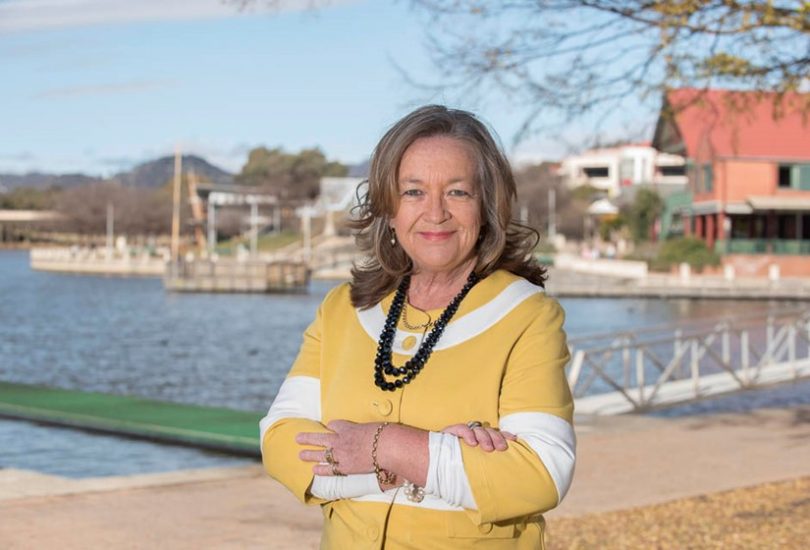
ACT Speaker Joy Burch delivered today’s Acknowledgement of Country in the Assembly in Ngunnawal – the local Indigenous language. Photo: ACT Labor.
Opposition Leader Alistair Coe also lauded the important and generous role the Ngunnawal people play in shaping the Canberran community.
“It is important that we remember and honour the Aboriginal heritage of the region through language and action,” he said.
“Last year on the 30th anniversary of the Legislative Assembly, this place was bestowed a rare honour – a handmade possum-skin cloak, skilfully crafted by 16 Ngunnawal women.
“This gift is on permanent display outside the Chamber and symbolises respect between the Ngunnawal people and the wider Canberra community. It is a daily reminder of our duties and responsibilities as lawmakers and the history of the ACT.”
Greens leader Shane Rattenbury said “this truly is an important occasion, as the Ngunnawal language is spoken in the Chamber we honour and pay our respect to our First Nations traditional custodians in a tangible way”.
“We express our Yindjamurra, a Ngunnawal word that means more than respect, that is wholesome and all-encompassing in its First Nations interpretation.
“We acknowledge the ongoing connection of the Ngunnawal people to this land, this special meeting place where clans have met for thousands of years.”












